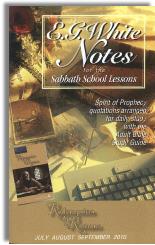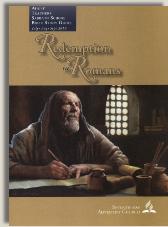|
||||||||||||||
Commentary on "The Election of Grace"
Day 3: Monday, September 6, 2010 - The Election of Grace
Overview
The lesson opens with a reference to Romans 11:1-7:
I ask then, has God rejected his people? By no means! For I myself am an Israelite, a descendant of Abraham, a member of the tribe of Benjamin. God has not rejected his people whom he foreknew. Do you not know what the Scripture says of Elijah, how he appeals to God against Israel? “Lord, they have killed your prophets, they have demolished your altars, and I alone am left, and they seek m life.” But what is God’s reply to him? “O have kept for myself seven thousand men who have not bowed the knee to Baal. So too at the present time there is a remnant chosen by grace. But if it is by grace, it is no longer on the basis of works; otherwise grace would no longer be grace.
What then? Israel failed to obtain what it was seeking. The elect obtained it, but the rest were hardened…
The lesson makes the point that God has not rejected Jews because the remnant who are saved are proof that salvation is open for Jew and Gentiles.
The lesson then refers to verses 7-10 and asks what is wrong with the idea that God purposely blinded the part of Israel that rejected Jesus. It then makes the point that God doesn’t prevent anyone from finding salvation, but that this passage refers to the role “these folk play in His work.”
Observations
Again, we have to believe that every word of Scripture is true. The fact that Romans and Ephesians and books like Job and Genesis refer to God’s sovereign choice, His hardening and softening men’s hearts, His sovereign power which we may not question (Job 42)—these clear statements are meant to be believed.
At the same time, there are many passages that command us to believe and to choose whom we will serve. These also must be believed.
Because we are limited and bound by three dimensions and time, we cannot see what our reality looks like from eternity. Instead, we are asked to trust God and to believe what He says, holding in tension these apparently contradictory statements while accepting both as truth.
Evangelical theologian Wayne Grudem suggests that we think of these apparently irreconcilable facts as being “concurrent”. In other words, these facts of God’s sovereignty and man’s responsibility happen at the same time, but God’s sovereignty happens outside our ability to understand or to control, and our responsibility happens in our own experience as we interact with God. We cannot explain the “how” of this apparent paradox, but since the Bible states them both, we must accept both as true and be willing to hold them in tension.
Romans 11:8 says God gave Israel
“a spirit of stupor; eyes that would not see and ears that would not hear, down to this very day.”
We have to believe that God did somehow catalyze their deafness and blindness to the gospel. Perhaps we can think of it as their becoming hardened in God’s presence as they suppressed the truth He revealed—but whether or not we can explain it, we have to accept that God was working for His ultimate glory in the hardening of Israel that continues to persist on a large scale.
As we go on in chapter 11 we will find that God will yet “unharden” Israel, and they also will experience many among them coming to faith and inheriting the promises God made to them through the patriarchs before the nation was founded.
When we attempt to explain how God works, we end up overstepping our bounds as humans. God asks us to trust Him, to believe He will do all He said He would do, and to give up our control of “outcomes”. God is the one who calls people and awakens them and saves them. We are not responsible for their salvation.
At the same time, we are responsible to be His Witnesses, speaking the gospel and testifying of His sovereign, saving power.
Romans 11 is not discussing “roles”. It is discussing God’s sovereign right and His certain involvement in Israel’s hardening and also in their eventual “un-hardening” and inheritance of all He promised them.
Summary
- Romans 11 teaches that God sovereignly elects His people.
- We cannot assume this idea of election means anything other than the Bible says.
- We are to believe everything written in the Bible, and the fact that many passages command us to believe and to choose whom we will serve means that we must believe both election and personal responsibility are true.
- We must hold these two facts in tension, content to let God be God and to trust Him.
- God’s sovereign election and choice proceeds outside of our realm in God concurrently with our responsibility to choose.
- We cannot control God’s sovereignty. Simultaneously, we must do what He asks us to do.
- Romans 11 is not about “roles”; it means exactly what it says. We are to believe it and trust the One who said it—and we are to make responsible choices in His presence.
Copyright 2010 BibleStudiesForAdventists.com. All rights reserved. Revised September 4, 2010. This website is published by Life Assurance Ministries, Glendale, Arizona, USA, the publisher of Proclamation! Magazine. Contact email: BibleStudiesForAdventists@gmail.com.
The Sabbath School Bible Study Guide and the corresponding E.G. White Notes are published by Pacific Press Publishing Association, which is owned and operated by the Seventh-day Adventist church. The current quarter's editions are pictured above.
Official Adventist Resources
Standard Edition Study Guide Week 11
Teacher's Edition Study Guide Week 11
Easy Reading Edition Study Guide Wk 11
Search the Complete Published Ellen G. White Writings


